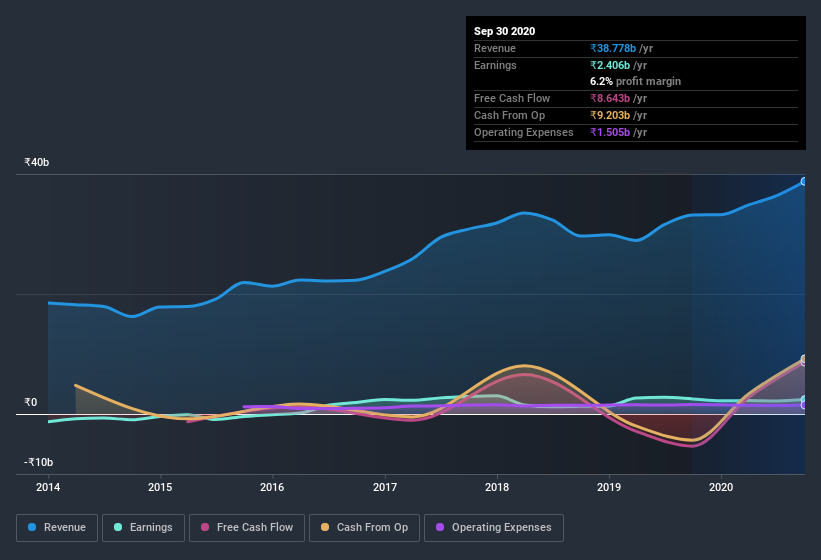Here's Why We Think Dhampur Sugar Mills's (NSE:DHAMPURSUG) Statutory Earnings Might Be Conservative

Many investors consider it preferable to invest in profitable companies over unprofitable ones, because profitability suggests a business is sustainable. That said, the current statutory profit is not always a good guide to a company's underlying profitability. Today we'll focus on whether this year's statutory profits are a good guide to understanding Dhampur Sugar Mills (NSE:DHAMPURSUG).
We like the fact that Dhampur Sugar Mills made a profit of ₹2.41b on its revenue of ₹38.8b, in the last year. As you can see in the chart below, its profit has declined over the last three years, even though its revenue has increased.
View our latest analysis for Dhampur Sugar Mills

Of course, it is only sensible to look beyond the statutory profits and question how well those numbers represent the sustainable earnings power of the business. Today, we'll discuss Dhampur Sugar Mills' free cashflow relative to its earnings, and consider what that tells us about the company. That might leave you wondering what analysts are forecasting in terms of future profitability. Luckily, you can click here to see an interactive graph depicting future profitability, based on their estimates.
Examining Cashflow Against Dhampur Sugar Mills' Earnings
As finance nerds would already know, the accrual ratio from cashflow is a key measure for assessing how well a company's free cash flow (FCF) matches its profit. In plain english, this ratio subtracts FCF from net profit, and divides that number by the company's average operating assets over that period. You could think of the accrual ratio from cashflow as the 'non-FCF profit ratio'.
That means a negative accrual ratio is a good thing, because it shows that the company is bringing in more free cash flow than its profit would suggest. That is not intended to imply we should worry about a positive accrual ratio, but it's worth noting where the accrual ratio is rather high. That's because some academic studies have suggested that high accruals ratios tend to lead to lower profit or less profit growth.
Over the twelve months to September 2020, Dhampur Sugar Mills recorded an accrual ratio of -0.25. Therefore, its statutory earnings were very significantly less than its free cashflow. To wit, it produced free cash flow of ₹8.6b during the period, dwarfing its reported profit of ₹2.41b. Given that Dhampur Sugar Mills had negative free cash flow in the prior corresponding period, the trailing twelve month resul of ₹8.6b would seem to be a step in the right direction.
Our Take On Dhampur Sugar Mills' Profit Performance
As we discussed above, Dhampur Sugar Mills' accrual ratio indicates strong conversion of profit to free cash flow, which is a positive for the company. Based on this observation, we consider it possible that Dhampur Sugar Mills' statutory profit actually understates its earnings potential! On the other hand, its EPS actually shrunk in the last twelve months. At the end of the day, it's essential to consider more than just the factors above, if you want to understand the company properly. If you want to do dive deeper into Dhampur Sugar Mills, you'd also look into what risks it is currently facing. Case in point: We've spotted 2 warning signs for Dhampur Sugar Mills you should be aware of.
Today we've zoomed in on a single data point to better understand the nature of Dhampur Sugar Mills' profit. But there is always more to discover if you are capable of focussing your mind on minutiae. For example, many people consider a high return on equity as an indication of favorable business economics, while others like to 'follow the money' and search out stocks that insiders are buying. So you may wish to see this free collection of companies boasting high return on equity, or this list of stocks that insiders are buying.
When trading Dhampur Sugar Mills or any other investment, use the platform considered by many to be the Professional's Gateway to the Worlds Market, Interactive Brokers. You get the lowest-cost* trading on stocks, options, futures, forex, bonds and funds worldwide from a single integrated account. Promoted
New: Manage All Your Stock Portfolios in One Place
We've created the ultimate portfolio companion for stock investors, and it's free.
• Connect an unlimited number of Portfolios and see your total in one currency
• Be alerted to new Warning Signs or Risks via email or mobile
• Track the Fair Value of your stocks
This article by Simply Wall St is general in nature. It does not constitute a recommendation to buy or sell any stock, and does not take account of your objectives, or your financial situation. We aim to bring you long-term focused analysis driven by fundamental data. Note that our analysis may not factor in the latest price-sensitive company announcements or qualitative material. Simply Wall St has no position in any stocks mentioned.
*Interactive Brokers Rated Lowest Cost Broker by StockBrokers.com Annual Online Review 2020
Have feedback on this article? Concerned about the content? Get in touch with us directly. Alternatively, email editorial-team@simplywallst.com.
About NSEI:DHAMPURSUG
Dhampur Sugar Mills
Manufactures and sells sugar and its byproducts in India.
Adequate balance sheet low.

